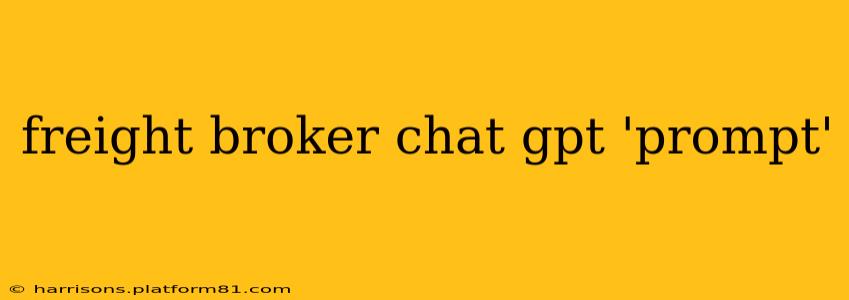Revolutionizing Freight Brokerage with ChatGPT Prompts: A Deep Dive
The freight brokerage industry is constantly evolving, demanding efficiency and innovation. Leveraging AI tools like ChatGPT, through carefully crafted prompts, can significantly streamline operations and improve profitability. This article explores how strategic ChatGPT prompts can revolutionize various aspects of freight brokerage.
What is a Freight Broker and How Does ChatGPT Help?
A freight broker acts as an intermediary between shippers who need goods transported and carriers who have the capacity to move them. ChatGPT, a large language model, can assist freight brokers in numerous ways, from automating tasks to improving communication and decision-making. Its ability to process and generate human-like text makes it a powerful tool for enhancing efficiency and accuracy. By crafting specific prompts, brokers can leverage ChatGPT's capabilities to their advantage.
What are the Best ChatGPT Prompts for Freight Brokers?
The effectiveness of ChatGPT hinges on the quality of the prompts. Here are some examples of powerful prompts categorized by their application within the freight brokerage process:
1. Lead Generation & Qualification:
-
Prompt: "Generate five cold email outreach scripts for trucking companies specializing in [specific cargo type] transportation from [origin city] to [destination city], highlighting the benefits of partnering with my brokerage." This prompt leverages ChatGPT's ability to create persuasive marketing materials tailored to specific target audiences.
-
Prompt: "Analyze this potential client's shipping needs (provided data): [insert client data] and suggest three optimal carrier matches from my database based on capacity, location, and historical performance." This utilizes ChatGPT's analytical capabilities to connect client needs with available carriers.
2. Carrier Communication & Negotiation:
-
Prompt: "Draft a professional email to carrier X confirming load details: [insert load details], including pickup and delivery deadlines, and requesting a rate quote by [date]." This streamlines the process of communicating complex load information.
-
Prompt: "Negotiate a lower rate with carrier Y considering their current rate of [amount], factoring in fuel surcharges, and highlighting the consistent volume of loads I provide." This uses ChatGPT's ability to simulate negotiation, providing brokers with strategic points to consider.
3. Documentation & Reporting:
-
Prompt: "Generate a load confirmation document including all relevant details from this load: [insert load details], ensuring compliance with FMCSA regulations." This prompt automates the creation of important legal documents.
-
Prompt: "Summarize the key performance indicators (KPIs) for the past month, including the number of loads brokered, average profit margin, and on-time delivery rate." This facilitates efficient reporting and performance analysis.
4. Problem Solving & Decision Making:
- Prompt: "Analyze the reasons for the delay in load Z, considering weather conditions, traffic incidents, and carrier communication, and suggest possible solutions." This leverages ChatGPT's analytical power for troubleshooting and proactive problem-solving.
5. Continuous Learning & Market Research:
- Prompt: "Summarize the latest news and trends in the freight market, focusing on [specific sector] and identifying potential opportunities and challenges." This helps brokers stay updated on industry changes.
How to Optimize ChatGPT Prompts for Maximum Effectiveness?
- Be Specific: The more detailed your prompt, the more accurate and helpful the response.
- Use Structured Data: Providing data in a structured format (e.g., tables) improves accuracy and understanding.
- Iterate and Refine: Experiment with different prompts to fine-tune the output to meet your specific needs.
- Verify Information: Always double-check information provided by ChatGPT, especially concerning legal and financial matters.
Can ChatGPT Replace Human Freight Brokers?
While ChatGPT is a powerful tool, it's crucial to remember that it cannot entirely replace human freight brokers. The human element—negotiation skills, relationship building, and critical thinking—remains essential for success in this industry. ChatGPT acts as a powerful assistant, enhancing efficiency and accuracy but not replacing the expertise and judgment of experienced professionals.
By strategically integrating ChatGPT prompts into their workflows, freight brokers can significantly enhance productivity, accuracy, and ultimately, profitability, paving the way for a more efficient and effective industry. The future of freight brokerage is likely to involve a strong partnership between human expertise and the capabilities of AI.
